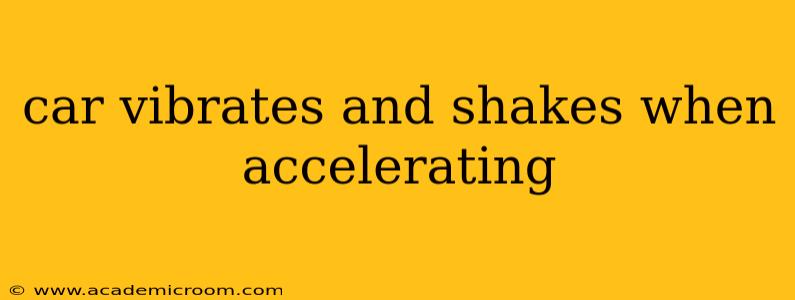Experiencing a vibrating and shaking sensation in your car while accelerating can be unsettling, but understanding the potential causes can help you address the issue effectively. This comprehensive guide explores common reasons behind this problem, offering solutions and advice for drivers.
Why Does My Car Shake When I Accelerate?
This is a common question with several possible answers, ranging from minor issues easily fixed at home to more serious problems requiring professional attention. The severity of the vibration and at what speed it occurs can often be helpful in narrowing down the cause.
Engine Misfires: A Common Culprit
One of the most frequent causes of car vibrations during acceleration is an engine misfire. This happens when one or more cylinders fail to ignite properly. This uneven combustion creates a noticeable shake or shudder, especially when accelerating. Misfires can stem from several issues, including faulty spark plugs, worn-out ignition coils, damaged wires, or even low fuel pressure.
Transmission Problems: Shifting Gears Smoothly
Transmission problems can also manifest as vibrations during acceleration. Worn-out transmission mounts, low transmission fluid, or internal transmission issues can all contribute to a rough ride and noticeable shaking. If the vibration is especially pronounced during shifts, the transmission is a likely suspect.
Driveshaft Issues: Power Transfer Problems
The driveshaft, responsible for transferring power from the engine to the wheels, can be a source of vibration if damaged or misaligned. Worn-out universal joints (U-joints) within the driveshaft are a common culprit. A damaged driveshaft can cause a significant vibration, particularly at higher speeds.
Uneven Tire Wear or Tire Pressure: A Simple Check
An often overlooked cause is uneven tire wear or improper tire pressure. Worn tires or those with inconsistent pressure can lead to vibrations that worsen during acceleration. Rotate your tires regularly and maintain the recommended tire pressure to prevent this.
Wheel Balancing and Alignment: Maintaining Stability
Wheels that are out of balance or improperly aligned can also induce vibrations during acceleration. An imbalance causes the wheels to wobble, creating shaking throughout the vehicle. Similarly, misalignment can put undue stress on the suspension and tires, resulting in vibrations.
Brake Problems: More Than Just Stopping
While less common, brake problems can occasionally contribute to vibrations during acceleration. Worn brake rotors or calipers that are sticking can cause a noticeable vibration, especially at lower speeds.
What if My Car Shakes When Accelerating at High Speeds?
High-speed vibrations often point to more serious issues, such as problems with the driveshaft, tires, or wheel balance. At high speeds, even minor imbalances or wear and tear become significantly amplified, resulting in stronger vibrations. It's crucial to address these issues promptly to prevent further damage and ensure safety.
How Can I Fix the Vibration in My Car?
The solution depends on the underlying cause. Simple issues, such as low tire pressure or worn spark plugs, can be addressed relatively easily. However, more complex problems like transmission or driveshaft issues require the expertise of a qualified mechanic. It's always best to have a professional diagnose the problem before attempting any repairs yourself, especially with mechanical components.
When Should I Take My Car to a Mechanic?
If the vibration is severe, persistent, accompanied by other unusual sounds or behaviors, or if you are unsure about the cause, it's crucial to seek professional help immediately. Ignoring the problem can lead to more extensive and costly repairs in the future.
Is it Safe to Drive with a Vibrating Car?
While driving with a mildly vibrating car might seem tolerable, continuing to drive with a significant vibration can be dangerous. It can affect handling, reduce stability, and potentially lead to more serious mechanical failures. It's advisable to limit driving and seek professional assistance as soon as possible.
This guide aims to provide a comprehensive overview of causes for car vibrations during acceleration. Remember, consulting a qualified mechanic for proper diagnosis and repair is crucial for ensuring both your safety and the longevity of your vehicle.
